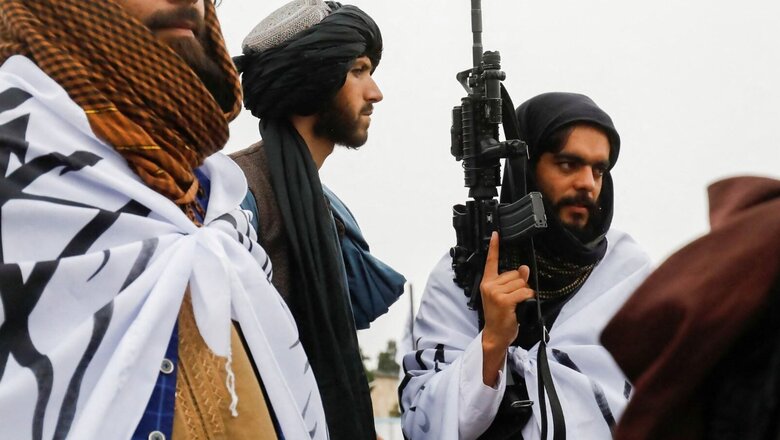
views
August 15 is a fateful date for Indians and Afghans, but for diametrically opposite reasons. Indians won their freedom 75 years ago. The Afghans lost theirs last year when Taliban 2.0 stormed back to power in Kabul, taking the world and perhaps themselves by surprise. The rag-tag movement of religious fanatics had managed to humble the coalition forces led by the most powerful country on the planet.
But first the key question: Is the ultraconservative Taliban an anomaly in our world with a preponderance of democratic societies? The guarded answer is ‘perhaps no’! The reason being that there is space for disparate dispensations. If military dictatorships, colonialists, communists, socialists, aristocracies, monarchies, theocracies, oligarchies, authoritarian and totalitarian regimes (such as North Korea) exist even today, then why not an ultra-orthodox theological entity like the Taliban that harks back to the 7th century?
The fact remains that centuries coexist within the confines of some countries, and millennia, in larger expanses. Even today there are pockets of hunter-gatherer tribals, living in a state of nature, in several countries including India (Sentinelese in the Bay of Bengal islands, Andaman tribes, etc). On the other hand, mankind is preparing to land on Mars. The holiest and vilest of individuals inhabit our planet! Like it or not, we need to recognise the reality of extremes in our midst.
That the Taliban could stage a comeback after 20 years, and a murderous dispensation like ISIS could hold sway over sizeable territories for many years, suggest that this medieval ideology has a resonance with at least a fringe segment of global populace. As such, if we cannot wish them away, we have no choice but to deal with them. But are we ready or know how to do so? The guarded answer once again is ‘perhaps no’!
Taliban 1.0 were shunned like a plague by the entire world except their mentor, Pakistan, as also Saudi Arabia and the UAE. In no time Afghanistan became a beehive of terror networks. The hijackers of IC 814 in December 1999 forced India to hand over Masood Azhar at Kandahar from where the Taliban helped him disappear. The ghastly 9/11 massacre plan was hatched on its soil resulting in the two decade long ‘War on Terror’.
Once again with Pakistan’s patronage, the Taliban staged a dramatic comeback one year ago. Their basic ideology — establishment of a puritanical Islamic Emirate adhering to tenets of pre-Islamic Pashtun tribal code and the Wahhabi Sharia — remains unchanged. It concedes a minimal role or space for women, non-Muslims and minorities; metes out severe punishment to the deviant; considers most forms of entertainment as immoral and scoffs at the Western concept of human rights and liberties. Consequently, Afghan women are once again at the receiving end.
“Nearly 400 civilians have been killed by the new regime. Despite promises of amnesty, targeted violence against former members of Afghanistan’s armed forces, dissidents and journalists has increased significantly,” The Economist reports. The security situation though has improved noticeably.
Once again jihadi outfits are suspected to be finding refuge in Afghanistan. A stark proof has been the detection and elimination of Ayman al-Zawahiri, head of Al-Qaeda, by an American drone on 31 July in the heart of Kabul. The Taliban feigned ignorance and is still ‘investigating’ the matter.
Alarmed, the comity of nations refused to recognise the Taliban, suspended developmental, economic and most humanitarian assistance. The US froze billions of dollars of Afghan funds, leaving the new administration in dire straits. Hundreds of thousands of educated and skilled Afghans have since fled. Meanwhile the nation is facing widespread and mounting poverty, hunger and disease.
That said, the two iterations are not identical. Taliban 2.0 are bereft of a towering leader like Mullah Omar whose writ ran across the movement. They now comprise distinct factions which often pull in different directions, as also jostle for power and primacy. Its so-called supreme commander — Hibatullah Akhundzada — has never been seen, nor is it certain that he is alive.
The absence of a central figure has left the international community wondering if their interlocutors have the necessary mandate to commit on the Taliban’s behalf. On the other hand, it has allowed the interlocutors to pass the buck and blame another faction or better still ISKP (Islamic state Khorasan Province) for the breach. The latter, a radical jihadi outfit, is at odds with the Taliban except the Haqqani network.
Two, the movement is divided between hardliners like the Haqqanis, (headed by Sirajuddin Haqqani, current interior minister and UN designated terrorist) who are more violent and ultra-conservative, resisting for example education of girls or the formation of an inclusive administration by sharing power with sizeable minorities like Tajiks and Hazaras.
Then there are the comparatively younger and less radical sections that are more exposed to the outside world. They understand the privations of isolation and are keen on securing international recognition while remaining true to their core beliefs. They are also the public face of the Taliban but have lost ground to the hardliners. Prominent figures among them include acting Deputy PM and Taliban co-founder, Mullah Abdul Ghani Baradar and acting defence minister Mullah Muhammad Yaqoub (son of Mullah Omar). “They tend to be more focused on “God and country” than on just “God,” writes Saad Mohseni.
Three, unlike 1996, ties have soured somewhat between Pakistan and Taliban as the latter often resents or ignores Rawalpindi’s dictation; opposes fencing of border by Pakistan; continues to reject the Durand Line as the boundary between the two countries; refuses to hand over or effectively restrain the TTP leadership; and (worse still for Islamabad), wants to mend fences with India.
The Taliban have also realised that Pakistan, in a mess itself, can neither provide them an economic lifeline nor help in their diplomatic rehabilitation. Even China, Pakistan’s ‘iron brother’, has done little other than dish out promises.
Four, Taliban 1.0 were pitted against the Northern Alliance (NA) led by battle hardened warlords like Abdul Rashid Dostum and Ahmad Shah Massoud (ASM), the Lion of Panjshir. They were receiving wholesome financial and material support from Russia, India, Iran and a number of other countries. Granted, these are still early days yet Taliban 2.0 face little external armed threat. Former vice president Amrullah Saleh and Ahmad Massoud, son of late ASM, have tried to revive NA as “National Resistance Front” but were forced to flee abroad when the Taliban took over most of the Panjshir valley. Confined to small pockets the front can at best give pinpricks to the Taliban whose challenges now are mostly from within and ISKP.
That in broad brush strokes is the situation as it obtains on the ground today. Notwithstanding the odds, the Taliban have been consolidating their hold and been generating some revenue through taxes and sale of narcotics. The international community (especially the West) has laid down a number of preconditions for engaging the Taliban, most of which it cannot and will not meet. Thus, formal diplomatic recognition remains elusive, yet more countries, including India, have started interacting with the Taliban informally.
India considers Taliban a terrorist outfit and had maintained no truck with them during 1996-2001. Again, all Indian diplomatic personnel at the embassy in Kabul and consulates were pulled out in August last year after the present dispensation took over, despite its assurances of security. However, local staff continued to function and assist with delivery of humanitarian assistance.
India has already provided significant quantities of humanitarian assistance including 20,000 MTs of wheat, 13 tons of medicines, 500,000 doses of Covid-19 vaccine (plus one million doses to Iran for Afghan refugees) to Afghanistan. More is on the way.
“India has a civilisational relationship with the Afghan people. In order to closely coordinate the effective delivery of humanitarian assistance, an Indian technical team has been deployed in our Embassy there,” stated the much anticipated press release of the Ministry of External Affairs on 23 June, announcing the reopening of the Indian embassy at Kabul. It marked a watershed moment in India’s outlook and approach towards the Taliban. Earlier that month the first ever official Indian delegation had visited Kabul and inter alia met “senior members of the Taliban”.
New Delhi had taken a bold and timely strategic decision to de facto acknowledge that the Taliban were there to stay. If the Taliban honour their commitments, formal recognition could be forthcoming sooner than later. India’s move is likely to be a boon for the Taliban as several other countries could follow suit.
New Delhi did not take this decision lightly. It followed careful deliberation and many rounds of known and perhaps discreet exchanges at several capitals with the Taliban. Kabul is believed to have given solemn commitments not to allow its soil to be used against Indian interests. Even so, India knows the risks as well as the necessity of a fresh approach. It bears the hallmark of a proactive and confident India, which can take hard decisions in national interest.
Will it succeed? Frankly, no one can tell or prescribe a fail-proof method of engaging the Taliban. There are bound to be hits and misses. Managing ties even with well-established states can prove challenging, as India has discovered with Pakistan and China. Yet, despite several false starts India has not given up.
An isolated and alienated Taliban, with nothing to lose, could become a bigger headache and let Afghanistan turn into a breeding ground of religious fanatics. Let us be clear. The Taliban will never give up their core beliefs, but given the right incentives, could overtime moderate their behaviour. It is certainly worth a serious try. The adage — “keep the friends close and enemies closer” — has rarely sounded so pertinent.
The author is Former Envoy to South Korea and Canada and Official Spokesperson to the Ministry of External Affairs. The views expressed in this article are those of the author and do not represent the stand of this publication.
Read all the Latest Opinion News and Breaking News here




















Comments
0 comment